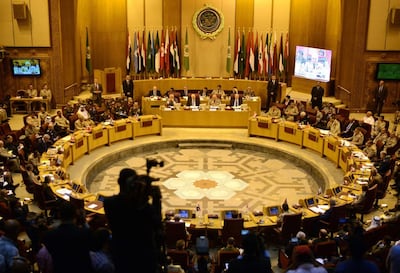When the Arab Peace Initiative was adopted at the Arab League’s Beirut summit 22 years ago, the participants thought they were presenting Israel with an offer so attractive, it could not be turned down. But Israel did. Now, as ideas are starting to circulate about the need to rebuild a serious political process after the Hamas attacks of October 7 and Israel’s subsequent war on Gaza, is there a chance to dust off the initiative and make it part of an overall package to solve the conflict, or is it too late for it to play any effective role?
First, let us remind ourselves of the basic elements of the initiative. In return for Israel withdrawing from all the Arab land it occupied in 1967, the Arab world was prepared to enter into collective peace treaties and collective security guarantees. The Arab world would accept an agreed solution to the refugee problem and commit to ending the conflict once and for all, that is by exercising no further claims to pre-1948 Palestine.
Israel, then under prime minister Ariel Sharon, almost totally dismissed the initiative, probably because it had no intention of ending the occupation. The US paid only lip service to the proposals, having been occupied with preparing a war on Iraq.
After the 2010-2011 Arab uprisings, the departure of Arab leaders of regional stature such as late King Abdullah of Saudi Arabia – who had been able to lead a process based on the initiative – and the signing of several Arab peace agreements with Israel that didn’t tackle the occupation issue directly, the initiative faced a natural death. It is important to note though that no Arab country has rescinded its signature from the initiative. It remains, at least theoretically, the official policy of every Arab country, even those that have signed peace agreements with Israel.

The recent events in Gaza have clearly shown that the cycle of violence between Palestinians and Israelis will not end if the root cause of the problem – the Israeli occupation – is not addressed. Limiting efforts to focusing on who rules Gaza after the war, while ignoring the need for an overall solution will be a waste of time.
In an address to the UN Security Council on December 29, I argued that the problem with most attempts to solve this conflict in the past was that they did not define the endgame. Negotiations became open-ended processes that attempted to define this endgame rather than concentrate on the steps needed to end the occupation and reach a two-state solution. Meanwhile, Israeli settlement activity continued unchecked while negotiations were taking place, killing the prospects of the very two-state solution the international community kept nominally supporting.
The Arab Peace Initiative does the opposite. It defines the endgame but does not offer a process to implement it. If the international community is serious about offering a process with a well-defined objective of ending the occupation within a specified time frame, the initiative can play an important role as part of a package where all parties are expected to do their part to end the conflict once and for all. If not, the international community will have to deal not with the question of Israeli occupation, but of Israeli apartheid, with a Palestinian population that has already exceeded that of the Israeli Jewish one in the areas under Israel’s control, and a minority ruling over a majority in a undemocratic way.
As difficult as starting a serious peace process to end the occupation is, it is still instructive to imagine what such a process should entail. The US would lead a time-bound process with a well-defined objective of ending the occupation and implementing a two-state solution. Negotiations would take place over necessary steps to reach that objective, rather than debating what the endgame should look like.
The Arab Peace Initiative would come in here as part of the Arab world’s efforts to facilitate the process. If the Israelis openly accept the principle of ending the occupation, the Arab Peace Initiative can significantly contribute by providing them with their security guarantees and by ending all further claims. That should not be rejected, as Israel did before.
The Arab world can also contribute to the two issues of governing Gaza as well as its reconstruction, provided these are steps within an overall package to end the Israeli occupation. Otherwise, these two issues will remain largely unresolved.
These are the conditions necessary, even if not sufficient, to offer a peaceful way forward. But they are hardly likely. They require a US administration willing to undertake a leadership role in an election year; an Israeli government – not this one – that is openly willing to end the occupation; and a new, elected, Palestinian Authority that is able to speak on behalf of Palestinians. It also requires an Arab world willing to recommit to the initiative in a meaningful way, and an Arab country willing and able to lead it along this path.
A monumental task? No doubt. No one should claim that solving the conflict is easy. But the international community needs to stop fooling itself – and the world – by repeating the mantra of support for a two-state solution without committing to a serious plan to implement it. This is the context within which the Arab Peace Initiative can be revived. Otherwise, it will remain in its present dormancy.
Live updates: follow the latest news on Israel-Gaza


